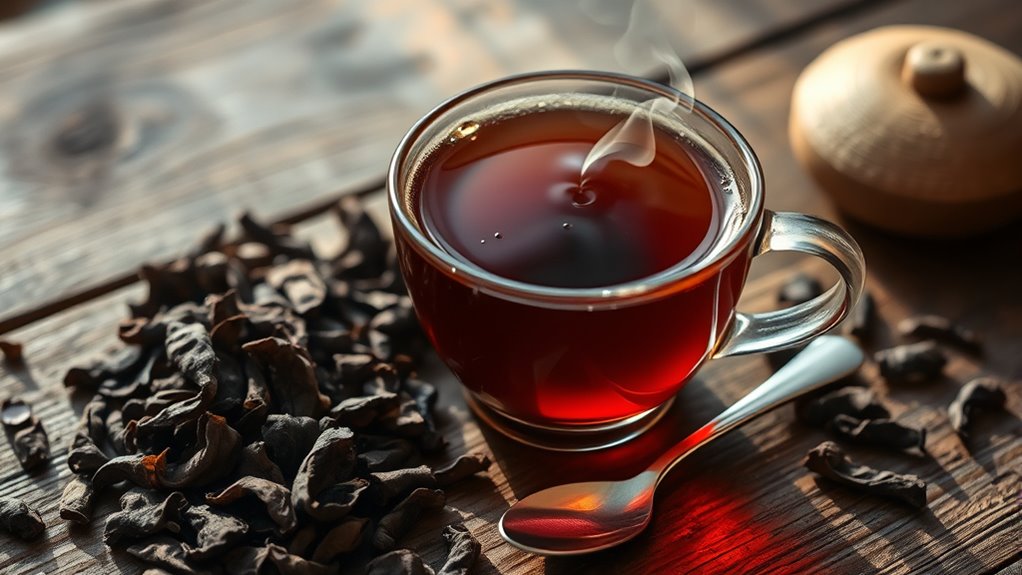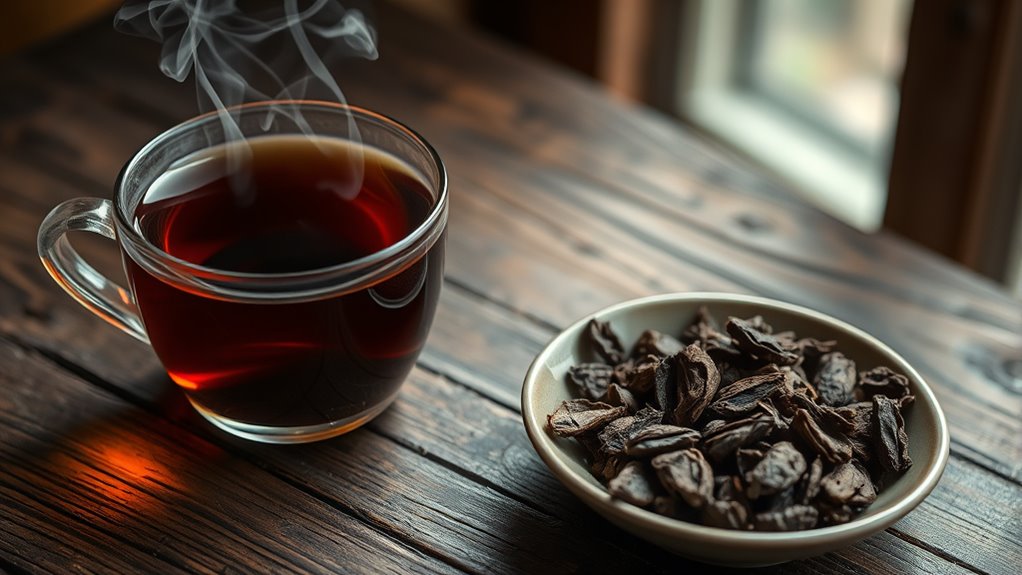Pu-erh tea may help lower your LDL cholesterol because its fermentation process creates beneficial compounds and probiotics that boost fat metabolism. These bioactive substances can reduce artery damage caused by oxidative stress and inflammation, supporting healthier cholesterol levels. Regular consumption might lead to gradual improvements, though it’s best as a supportive addition rather than a replacement for medical advice. To understand the full science behind Pu-erh’s health benefits, keep exploring what makes this tea unique.
Key Takeaways
- Fermentation enhances antioxidants and produces beneficial metabolites that support lipid metabolism and reduce LDL cholesterol.
- Pu-erh tea’s microbial activity generates bioactive compounds that help lower LDL levels naturally.
- Rich antioxidants in Pu-erh combat oxidative stress, decreasing artery damage and plaque buildup linked to high LDL.
- Fermentation boosts probiotic content, improving gut health and aiding in lipid regulation.
- Regular consumption of Pu-erh tea may gradually support cholesterol reduction as part of a healthy lifestyle.

If you’re looking for natural ways to manage your cholesterol levels, Pu-erh tea might be worth considering. This unique fermented tea has gained attention not only for its rich, earthy flavor but also for its potential health benefits, especially regarding LDL cholesterol. One of the key reasons behind this is the fermentation benefits that Pu-erh undergoes during production. The fermentation process involves specific microbial activity that enhances the tea’s bioactive compounds, creating unique substances not found in other teas. These fermentation benefits may contribute to lowering LDL cholesterol by influencing how your body processes fats. The microbes involved produce beneficial metabolites that help improve lipid metabolism, aiding in the reduction of bad cholesterol levels.
Pu-erh tea’s fermentation enhances bioactive compounds that may help lower LDL cholesterol naturally.
Additionally, Pu-erh tea is packed with tea antioxidants, which play a crucial role in supporting your cardiovascular health. These antioxidants combat oxidative stress, a major factor that damages arteries and promotes plaque buildup. When your arteries are less prone to oxidative damage, your risk of elevated LDL cholesterol and subsequent heart issues decreases. Drinking Pu-erh regularly allows you to harness these antioxidants’ protective effects, which can help keep your cholesterol levels in check over time. The antioxidants also have anti-inflammatory properties, reducing inflammation in your blood vessels, which is another pathway through which LDL cholesterol contributes to cardiovascular disease.
Moreover, the fermentation process enhances the availability and potency of these antioxidants, making Pu-erh a potent source of health-promoting compounds. Unlike some teas that simply contain antioxidants, the fermentation benefits of Pu-erh amplify their effectiveness, giving you a more potent tool for managing cholesterol naturally. The microbial activity during fermentation not only boosts antioxidant content but also introduces beneficial probiotics, which can improve gut health. A healthier gut may better regulate lipid levels, further supporting your efforts to lower LDL cholesterol. Microbial activity during fermentation can generate bioactive substances that specifically influence lipid metabolism pathways.
Incorporating Pu-erh tea into your daily routine is simple and enjoyable. You can brew it just like black or green tea, savoring its earthy, rich flavor while reaping its health benefits. Over time, consistent consumption may help you see a decrease in LDL cholesterol levels, thanks to the synergy of fermentation benefits and tea antioxidants working together. While it’s not a substitute for medical treatment, adding Pu-erh to your diet provides a natural, enjoyable way to support your heart health. Just remember that moderation is key, and it’s always best to consult with your healthcare provider before making significant changes to your health regimen.
Frequently Asked Questions
Can Pu-Erh Tea Replace Cholesterol-Lowering Medications?
You shouldn’t rely on Pu-erh tea alone to replace cholesterol-lowering medications. While natural remedies and herbal supplements like Pu-erh tea may support your heart health, they aren’t proven substitutes for prescribed treatments. Always consult your doctor before making changes. Incorporating Pu-erh tea into a healthy lifestyle can be beneficial, but it should complement, not replace, medication prescribed for managing your LDL cholesterol levels.
How Much Pu-Erh Tea Should I Drink Daily for Benefits?
Thinking about tea consumption is like tuning a guitar—you want just the right amount. For potential benefits, you should aim for about 1 to 3 cups of Pu-erh tea daily, which roughly equals 200-300 milliliters. Keep in mind, moderation is key, and it’s best to consult with your healthcare provider. Stick to this daily intake, and you might enjoy the tea’s potential effects without overdoing it.
Are There Any Side Effects From Drinking Pu-Erh Tea Regularly?
You might wonder about side effects from drinking pu-erh tea regularly. While it offers health benefits like improved digestion and cholesterol management, excessive intake can cause issues such as insomnia, upset stomach, or elevated caffeine levels. Different tea varieties contain varying compounds, so moderation is key. Stick to recommended amounts and enjoy pu-erh tea as part of a balanced diet to maximize its health benefits without adverse effects.
Does Pu-Erh Tea Interact With Other Cholesterol Medications?
Think of tea interactions as a delicate dance with your medication. You might wonder if pu-erh tea and cholesterol meds can waltz together smoothly. While some studies suggest compatibility, it’s crucial to consult your healthcare provider first. Pu-erh tea’s active compounds could influence medication absorption or effectiveness. Always check medication compatibility to guarantee you enjoy the benefits without stepping on any toes.
Is Pu-Erh Tea Suitable for People With Hypertension?
If you have hypertension, you should be cautious with pu-erh tea. It contains caffeine, which might raise your blood pressure if you’re caffeine sensitive. Also, if you have a tea allergy, drinking pu-erh could trigger reactions. Always verify with your healthcare provider before adding it to your routine. Moderation is key, and paying attention to how your body responds helps ensure it’s safe for you.
Conclusion
So, don’t dismiss pu-erh tea too quickly. While it’s not a magic cure, drinking it regularly can help lower your LDL cholesterol levels. You might worry it’s just another fad, but research suggests there’s real potential here. Just remember, combining it with a healthy diet and exercise makes a bigger difference. So, give it a try—you might find it’s a tasty, natural way to support your heart health without any fuss.










